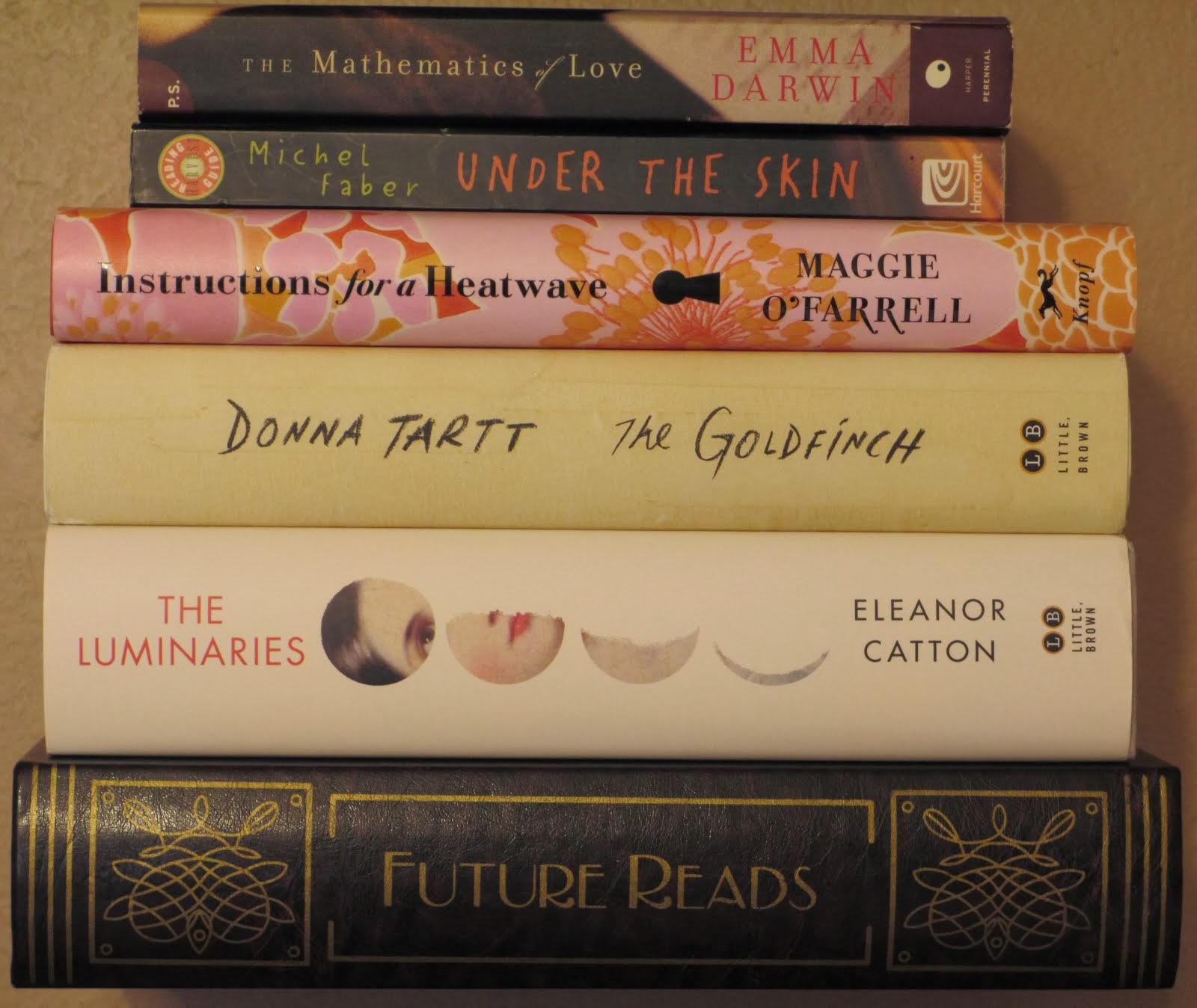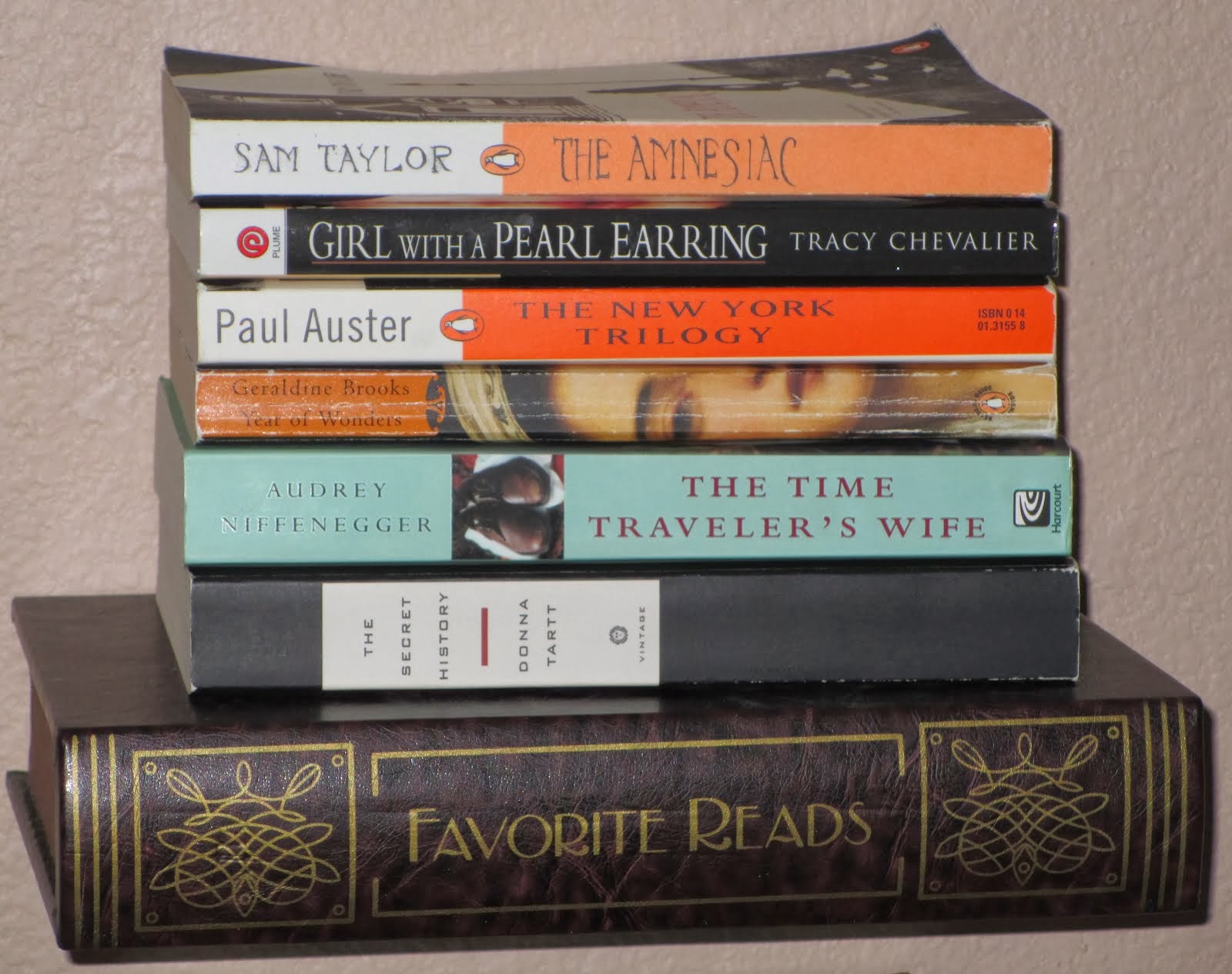First post of the new year! Never mind the fact that we're already midway through February. I've got to start somewhere.
Contrary to popular belief (or evidence garnered from this blog), I really have been reading over the past eight months. I just haven't gotten around to blogging very frequently. Instead, I've gotten farther and farther behind, leaving me more and more overwhelmed. (And blogging is supposed to be
fun. If it's overwhelming, what's the point?)
Because of this, a wise man once told me, "You ought to publish a post of mini-reviews or you'll never blog about all of these books you've been reading," and I am finally taking his advice. So, here you will find a host of worthless mini-reviews of books I've read during the past year but have never blogged about. Yeah, unfortunately this post is more for me than for you. I just like to have a complete record of what I've read, so
this won't happen again.
And so it goes:
Astrid & Veronika by Linda Olsson (a Book Club selection: I think it was Christy's)
Here's the story of two lonely Swedish women, one young and one old, who strike up an unexpected but fulfilling and healing friendship by virtue of living in houses next door to each other.
Why is my most vivid memory of this book that of Astrid and Veronika spooning with each other? I'm sure it has nothing to do with Book Club member Claire's odd experience with her college roommate. I do think, though, that it's because it seemed so unlikely and so far from something I would have done and . . . and just plain
awkward.
If you read this book and have any questions about it, though, email the author! She is very friendly and will probably actually write back to you and explain whatever it is you're wondering about. She praised me for being such an attentive reader, although once I saw the answer to my question I knew that a truly attentive reader could have answered this question for herself. Oh well.
A favorite quote:
"I think that perhaps there are no such defining moments at all. Beginnings and ends are fluid, long chains of events where some links seem so insignificant and others so very momentous, while in fact all have the same weight. What may appear as a single dramatic moment is just a link between what was before and what comes after."
The Baron in the Trees by Italo Calvino
This book was given to me by the love of my life, and for this reason alone I'm sure I would have found it fascinating--perhaps even if it had been written by
Paulo Coelho. But, lucky me, it was written by Italo Calvino instead. I'm sure I need to read more of his books (
If On a Winter's Night a Traveler, for instance), but this one is a great start. It's the story of an 18th century Italian family of noble descent whose older son Cosimo, at age twelve, climbs up into the trees and decides he will never come back down. Contrary to every other such decision by twelve-year-old boys the world over, he sticks with it, never again setting foot on the ground.
Dream Story by Arthur Schnitzler
The inspiration for Stanley Kubrick's film
Eyes Wide Shut. The book and the film differ somewhat (of course), but I found the book intriguing and thought-provoking. Unfortunately, as I read it months and months ago, I can't remember what intrigued me about it, or what thoughts it provoked. I will venture to say it was good enough to re-read, and I would like to do that sometime in hopes that it will better stick in my mind. This shouldn't be too difficult, as it is very short.
In the Woods by Tana French (a Book Club selection:
Charity's!)
This was an excellent mystery: finally, another that ranks highly on my Agatha Christie scale! The premise alone ought to grab you: Years ago, three young Irish friends went into the woods to play. Only one returned. He had no memory of what had happened that afternoon, and no one ever figured out the fate of his two friends. (That right there would be enough to snag my interest!) But there's more: the one surviving boy grew up to be Detective Ryan, who is investigating the murder of a twelve-year-old girl whose body was found in those same woods. Is there a link between the two mysteries?
This is a suspenseful thriller with the favorable distinction of also being well-written. It is also the first in the Dublin Murder Squad series, but (although #2 sounded very interesting!) I try to avoid getting mired in a series of books. There are too many individual books waiting for me to read them!
Legends of the Fall by Jim Harrison
This book actually contained a trio of novellas ("Revenge," "The Man Who Gave Up His Name," and "Legends of the Fall"), but I picked it up because I've seen the movie made from the third novella, and I was curious to discover its original manifestation. I found it quite surprising that Legends of the Fall began as only a novella. The movie seems like such an epic! You would think it had been adapted from a thousand-pager.
Harrison has such an odd style of writing. It is rambling, resigned, almost emotionless. His stories are told in an off-hand manner, as if with a sigh. That's not necessarily a criticism, though--merely an observation. I have also read his book
Returning to Earth, and I plan to read its prequel,
True North.
My Fair Lazy by Jen Lancaster
"Thanks a lot, Miles Davis. You've totally ruined waffles for me."
When I read this book I was in need of something light, and this certainly fit the bill. It's not my kind of book, especially as it was written from the POV of a woman obsessed with reality TV, but I can definitely admit that it was light-hearted and funny.
Never Let Me Go by Kazuo Ishiguro (a Book Club selection: mine!)
I really, really liked this book and am very disappointed in myself for not writing about it last July when I read it. However (not to mention extenuating circumstances that distracted me) I'm sure I was daunted by the feeling that I had to top
my last post about a book of Ishiguro's, a link to which was posted on his official facebook page! (That was an exciting day for me.)
NLMG is a strange sci-fi/coming-of-age novel which thrilled me with its slow reveal of the truth behind the lives of Tommy, Kathy and Ruth. I can't even begin to tell you how much I love books that dole out their secrets so slowly and tantalizingly.
I haven't seen the movie yet, but I plan to.
The Other by Thomas Tryon
This was a good twin/evil twin story that was somehow both banal and engrossing. I found the twins' secret easy to guess, but even so it was an entertaining read. The writing was nothing special, and I don't find it surprising that this book has been largely forgotten, but I don't regret reading it.
The Perks of Being a Wallflower by Stephen Chbosky
Here's a book that covers nearly every teen-angst-causing issue that you can imagine (except for vampires). Drugs, drinking, homosexuality, suicide, teen sex--
Wallflower has it all. But I can overlook this tiny book's attempt at being all-encompassing, because its narrator is so endearing in an awkward and quirky kind of way.
I made a note of some of his statements that were favorites of mine, Napoleon Dynamite style:
“I think it would be great if sledding were always enough, but it isn’t.”
"We accept the love we think we deserve."
"Some people use thoughts to not participate in life." (This is reflected in a review quoted at the beginning of the book: "Passivity, and thinking too much, lead to confusion and anxiety.")
"[
To Kill a Mockingbird] is now my favorite book of all time, but then again, I always think that until I read another book." (What reader hasn't felt the same way before?)
"I really think that everyone should have watercolors, magnetic poetry, and a harmonica." Wouldn't it be great if life were that simple? Wait, though. I don't have magnetic poetry OR a harmonica. Maybe that is all I need?
Everyone’s heard the phrase “deer in headlights”, right? And it’s such a cliché. But here we get “My brother looked at my dad like a deer caught by my cousins.” It’s so refreshing. And yet, as immediately understood as its more hackneyed antecedent.
So, yeah, I liked this book.
The Shadow of the Wind by Carlos Ruiz Zafon (a Book Club selection: mine!)
This book deserves a complete blog post, as I deemed it a Must Read, but alas. I waited too long to write about it.
I could complain about some things (the sometimes stilted dialogue, I would assume due to the translation; that I guessed on page 66 who the burned man was, although the truth wasn't actually revealed until much closer to the end of the book; and that the ending explained a little
too much and wrapped everything up neatly with a bow) but the reading of it was so much fun that I didn't care. Sometimes while I'm reading
books like these I start to wonder in the back of my mind . . . do I
really like to read? And then a book like
Shadow of the Wind comes along and I fall in love with reading all over again. YOU NEED TO READ THIS BOOK. You will love it too.
My favorite quote:
"The pleasure of reading: exploring the recesses of the soul, letting myself be carried away by imagination, beauty, and the mystery of fiction and language . . . by reading, I can live more intensely."
HOW TRUE! I pity anyone who has never realized the accuracy of the preceding statement.
Wait Till Helen Comes by Mary Downing Hahn
A just-barely-surpassing-mediocre YA ghost story that I remember next to nothing about. I saw it at one of my kids' Scholastic book fairs, and you know I can't pass up a tale of a good haunting. Apparently I can completely forget them, though.
What the Birds See by Sonya Hartnett
Here's an appealing story that begins with the tragic disappearance of three siblings, tangentially viewed through the eyes of an unwanted nine-year-old boy. My memory of this book is vague at best, but I found it well-written and arresting. I would read it again.
When You Reach Me by Rebecca Stead
I
really enjoyed this unique and subtle YA enigma. I was just sure Bookworm Child would, too, but I don't think she gave it a fair shake. Disappointing. I thought it was great, and another one worthy of a re-read.
The best I can do is to quote the back of the book: "This remarkable novel takes place in the real world but holds a fantastic puzzle at its heart.
When You Reach Me is an original, and a brilliant and profound delight."






























